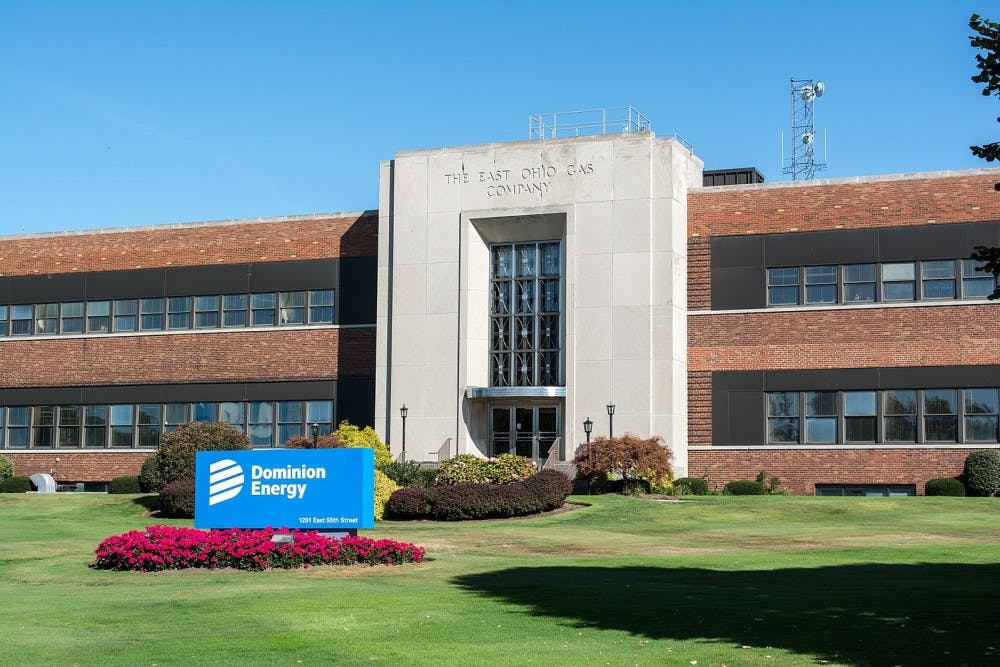Within the deluge of on-Grounds internship and job recruitment opportunities streaming into my inbox, one company keeps reappearing: Dominion Energy. To most students this name wouldn’t particularly stand out, but for me it elicits a strong feeling of disgust. I’m from Charlottesville. As a high schooler, I attended a meeting hosted by Virginia Organizing, Clean Virginia and Appalachian Voices. Only then did I learn about how Dominion Energy abuses its monopoly power and takes advantage of Virginians, all while maintaining a facade of being energy efficient and eco-friendly. If the University wants to achieve its stated purpose of “developing responsible citizen leaders,” it shouldn’t encourage students to work for an organization which has environmentally irresponsible and damaging practices.
Dominion is misleadingly classified as a “public utility holding company.” Within its areas of operation, it has been granted a monopoly by the state and provides electricity to 67.5 percent of Virginia ratepayers. A majority of Virginians cannot opt out of paying Dominion, lest they go without power. Consumers have no leverage because they have no choice. This privileged position has been utilized in a predatory manner. Rather than serving the public, Dominion inevitably is only beholden to one thing — their profit margin.
After Dominion was granted monopoly rights, price setting power fell to the State Corporation Committee. This regulatory body is supposed to do the job of free market forces — set a price that reflects the value of the good or service being provided. However, Dominion’s profits have been deemed higher than what regulators see as reasonable, although Virginia’s energy usage has leveled off and reviews of utility bill rates were frozen until 2020.
Virginians pay the eighth highest electricity bills of any state. Average Dominion residential bills have increased substantially since 2007. The SCC’s approved profit rate for Dominion is 9.2 percent, yet they have consistently exceeded this, reporting a profit of 13.47 percent last year. Through lobbying efforts they pushed a law which enables this price-gouging to continue. The 2018 Grid Transformation and Security Act halted the biennial reviews of their rates, thus blocking the SCC from lowering rates or enforcing ratepayer refunds in clearly existing cases of overcharging. Rather than refunding exploited consumers, Dominion can now divert this illegally reaped profit into “new capital investments.”
The Grid Transformation and Security Act did require Dominion to use some of these excess profits in an $870 million, decade long, energy efficiency projects proposal. But energy efficiency projects reduce overall consumption and lower energy bills — both of which directly oppose Dominion’s profit motive. It’s no surprise that Dominion’s first filed plans for meeting this requirement outlined roughly $261.7 million in efficiency spending, leaving $96.8 million classified as “lost revenues.”
Dominion is obligated by Virginia’s Constitution to provide energy “in the interests of the consumers of the Commonwealth.” Getting the state regulators to approve an underground power line project — costing ratepayers $2 billion and only improving grid reliability by 0.00002% — doesn’t do so. Spending over $10.7 million on political donations to both Democratic and Republican legislators since 1996 doesn’t do so. Actively avoiding energy efficiency initiatives doesn’t do so. What they’re really doing is providing energy in a way that decreases the economic, environmental and democratic well-being of the Commonwealth.
However, a quick visit to their website suggests otherwise. An article highlighting electric school buses, a clean energy page and claims of “environmental stewardship” are shining examples of disingenuous corporate pandering to the popularity of environmentalism. What Dominion fails to disclose is that they rank 50th out of 51 major utilities on energy efficiency. They don’t talk about their Atlantic Coast Pipeline project which will devastate Virginian ecosystems and communities. The net-meter cap law they lobbied hard for, that severely limits the amount of households that are allowed to produce renewable energy and sell the excess back to the grid, is hidden.
The purpose section of U.Va.’s mission statement says the University “serves the Commonwealth of Virginia.” It cites “community” and “integrity” as core values. The engineering school’s vision statement highlights “societal impact.” If the University and its associated organizations take seriously their espoused goal of producing positive leaders, they need to think harder about what careers and corporations they’re funneling students into. Dominion, which has been shown to overcharge consumers by approximately $250 a year, is at the very least bad for Virginians — including U.Va. students — who have to pay energy bills. More importantly, Dominion forces residents to financially sustain a corporation that may conflict with their views on climate change. They delay climate action and perpetuate environmental degradation, and they are getting rich doing it.
I don’t deny that their internship programs may be a great work experience. But positive individual experiences do not equate to net positive impacts on the community. The evidence is clear that Dominion’s activities don’t align with the University’s described vision for who its students are and what their role in the world is. As Dominion’s slogan points out, “actions speak louder.” U.Va.’s choice to market Dominion to its students says more about their commitment to values than any written statement could.
Anna Grace Calhoun is a first-year student in the Engineering School.







